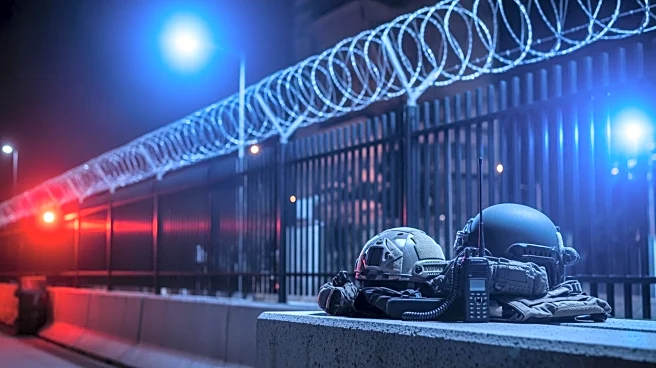What's Happening?
A group of suspected Haitian gang members fired upon U.S. Marines stationed at the American Embassy in Port-au-Prince, Haiti. The incident, which occurred on Thursday, was confirmed by Capt. Steven J.
Keenan, a spokesman for the U.S. Marines. The Marines returned fire, and no injuries were reported among the American forces. This event underscores the volatile security situation in Haiti, where gangs control approximately 90% of the capital, extorting businesses and battling for territory with heavy weaponry. The U.S. Embassy remains operational despite numerous State Department warnings advising against travel to Haiti due to risks of kidnappings, crimes, and civil unrest. The security situation has deteriorated significantly since the assassination of President Jovenel Moise in 2021, which left a power vacuum and halted elections.
Why It's Important?
The attack on the U.S. Embassy highlights the severe security challenges facing Haiti, impacting both local and international stakeholders. The control of gangs over the capital poses significant risks to diplomatic missions and international aid efforts. The United Nations has reported that gang violence has displaced over 1.3 million Haitians, exacerbating the humanitarian crisis. The U.S. and other nations are concerned about the stability of Haiti, as the lack of governance and ongoing violence could lead to further regional instability. The recent UN Security Council decision to deploy a gang suppression force of 5,500 troops reflects the international community's commitment to addressing the crisis, although previous efforts have struggled to contain the violence.
What's Next?
The deployment of the UN gang suppression force is expected to commence soon, aiming to curb the influence of heavily armed criminal groups in Haiti. The effectiveness of this force will be closely monitored by international observers, as previous smaller deployments have faced challenges in reducing gang violence. The U.S. Embassy will likely continue to operate under heightened security measures, and further incidents could prompt additional diplomatic or military responses. The political situation remains uncertain, with no elections scheduled to fill the leadership void left by President Moise's assassination.
Beyond the Headlines
The ongoing crisis in Haiti raises ethical and legal questions about international intervention and sovereignty. The deployment of foreign troops to combat gangs may lead to debates over the balance between humanitarian aid and respect for national autonomy. Long-term solutions will require addressing the root causes of gang violence, including poverty, lack of education, and political instability. The international community's role in supporting Haiti's recovery and development will be crucial in preventing future crises.









